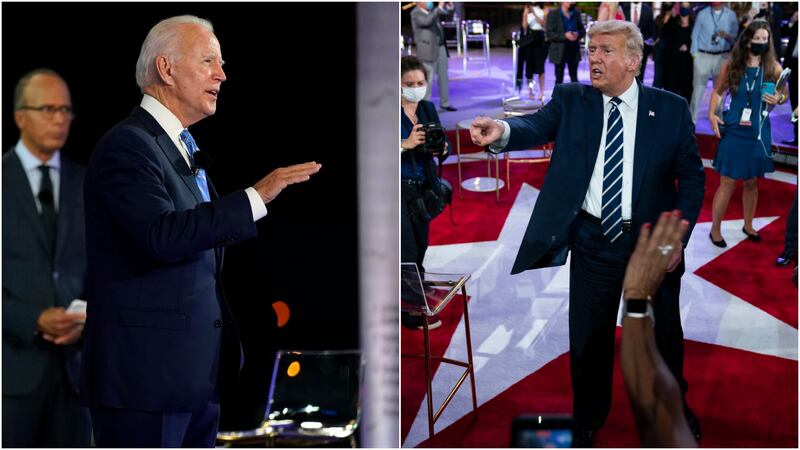Thursday night’s dueling town hall meetings were only slightly better than the first presidential debate. President Donald Trump and former vice president Joe Biden still were talking over each other — one was on NBC and other on ABC at the same time — but at least they could be heard clearly.
Their messages, however, were no clearer than before.
The American people, millions of whom either already have voted or have ballots ready for dropboxes or mailboxes, were looking for some direct answers. What they got were more dodges and confusion, and more reasons for concern.
The one question dogging the Biden campaign is whether he favors packing the Supreme Court. This hasn’t been an issue since President Franklin Roosevelt announced plans to increase the court, potentially to 15 justices, in 1937. He made this announcement after having won reelection in the 1936 election. Court packing had not been a campaign issue. The president had been upset by the court overturning many of his New Deal efforts to battle the Depression.
Despite Democrats controlling both houses, Congress never even voted on Roosevelt’s plan, and Americans were believed to be opposed to it. Critics called it a power grab. Even the vice president opposed it. In retrospect, it could be argued that voters should have known about it before the election.
Now, the plan has resurfaced, during an election, from the liberal wing of the Democratic Party in response to what is perceived as a hurried confirmation process for Supreme Court nominee Amy Coney Barrett. And yet Biden continues to act coy.
He told town hall host George Stephanopoulos he isn’t a fan of court packing, but that if Barrett is confirmed, “I’m open to considering what happens from that point on.” In any event, he plans to take a position on the matter before Election Day.
But Election Day has now become more of a deadline than an event. Millions of Americans, including most Utah voters, already have received ballots in the mail and are voting now. They want, and deserve, a definite answer on an issue that could fundamentally change American government.
On the other channel, President Trump was busy telling host Savannah Guthrie that, concerning COVID-19, “Just the other day they came out with a statement that 85% of the people that wear masks catch it so ... that’s what I heard and that’s what I saw.”
Not only are politicians not being direct with the American people, they are not engaging with one another, either.
This potentially dangerous statement misconstrued a study cited by the Centers for Disease Control and Prevention that found, of a group of about 150 patients surveyed, 85% said they had worn a mask either often or always during the time they would have been infected.
Several other factors were involved in this study, including that the infected people were found to have been twice as likely to eat in restaurants, where masks are removed in order to eat, than a similar group of noninfected people.
These were just two examples. Obfuscation is not a new tactic in elections. But that doesn’t ennoble it. What voters need in this election is clarity, accuracy, transparency and direct answers.
Several news reports this week noted that Oct. 16 was the one-year anniversary of the last time House Speaker Nancy Pelosi and President Trump spoke to each other.
Not only are politicians not being direct with the American people, they are not engaging with one another, either.
None of this bodes well for the nation or its ability to solve the problems it faces.

